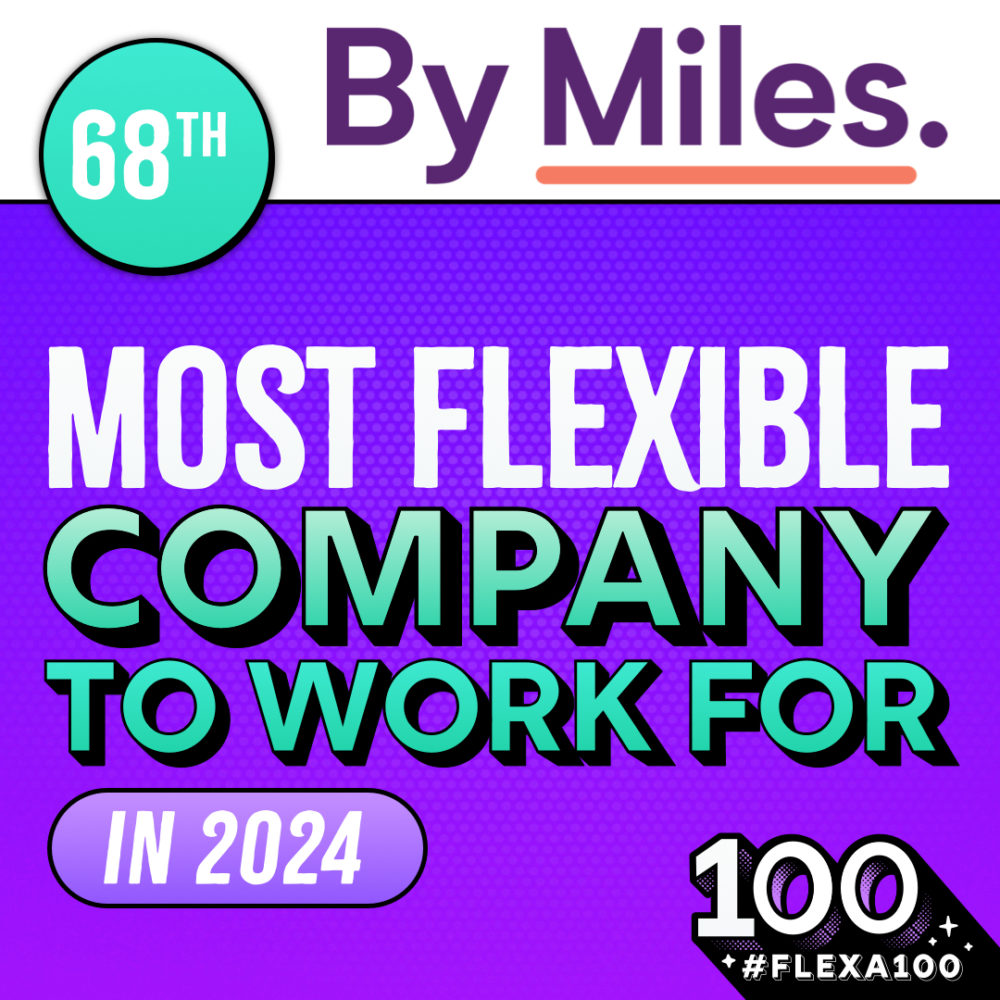This International Women’s Day, the UN have been highlighting how investment in women will help create a more just, equitable and prosperous world. It’s a message we stand by – not just in principle, but in practice.
Here, we talk to some of our team about the work we’ve undertaken to ensure fairness is woven into everything we do.
Addressing the leadership imbalance.
To put it simply, there’s no good case for the male-dominated model of leadership so common in the UK and around the world.
Time and again, studies like McKinsey’s ‘Diversity Wins’ show that fairness and financial performance go hand in hand.
Even though “a substantial differential likelihood of outperformance—48 percent—separates the most from the least gender-diverse companies” we don’t see this reflected across the country’s C-suites. As recently as 2 years ago, 96% of FTSE350 CEOs were men.
At By Miles, our CEO, Maddy Howlett, is just one part of a Senior Leadership Team that sees a 50:50 split between men and women. As, our COO, Becky Downing explains, that’s (unfortunately) not a common state of affairs:
“I used to run an InsurTech in home insurance. It was a dream of mine to get to a 50:50 [split between men and women]. It can be hard to achieve that in the tech space, by virtue of the fact that, traditionally, particular roles – like coding – have been more attractive to men. So we had the target, but we never got there. It’s really nice to be part of a company that has achieved that.

“I really appreciate that By Miles walk the walk when it comes to inclusivity, rather than simply paying lip service to it.
“Maddy does a great job of driving that, and it filters through the whole company. It manifests in very real ways, like our genuine commitment to closing the gender pay gap.”
(It’s worth reminding ourselves that the global gender disparity gap is 68.1% in favour of men and that it will take 169 years to achieve economic gender parity based on current rates.)
For us, fairness isn’t just about making sure people are paid fairly for their work. It’s also about reshaping our expectations of what work looks like – and opening up a broader range of opportunities…
Fairness through flexibility.
We’re proud to be certified as one of the UK’s most flexible employers. These policies benefit all of our people – and for all kinds of reasons.

But there’s no denying that the traditional structure of work has been a barrier for those with responsibilities of care outside their professional life. Though things are gradually changing, those responsibilities still tend to fall disproportionately on women. To quote Becky again:
“The challenge of juggling other responsibilities with career has often been what’s held women back. By Miles flexible working policies recognise and accommodate that in a way that doesn’t hinder progression.”
That flexibility is the result of carefully-consideration, as Dan Watts, our Talent and Culture lead explains:
“As well as being fully committed to a remote-first approach, we partner with Flexa to get insight and expertise from them around how that supports women in particular – in terms of specific obstacles they might face.”

Of course, policies mean very little if they’re not matched by the organisational culture. There are countless examples or organisations that introduced unlimited holiday in order to ensure people got enough time off, only to find they took less as a result. Similarly, cultural tropes can stop men taking the paternity leave they’re entitled to. That, in turn, impacts the careers of mothers, as Becky points out:
“In previous organisations I’ve worked in, men would feel scared to take paternity leave – even if they wanted to – because of how it would be perceived. I cannot imagine that happening at By Miles – they’d be 100% supported.”
Refusing to replicate bias.
You can set up internal policies to counter societal gender biases. But you can’t necessarily account for how things are done in other organisations. And that’s important – because it inevitably impacts the hiring process.
If you recruit based on the strength of CVs, you have to trust that all the candidates you’re considering have been given a fair chance to strengthen that CV. If not, your hiring will simply replicate the biases present elsewhere, unravelling your hard work. So what’s the alternative? Dan explains:

“At By Miles, we base our hiring on candidates evidencing the behaviours and virtues we value as much as we do technical skills. If it’s ever a choice between the two, we’d always go with stronger behaviours.
“It’s much easier to help someone with the right behaviours to build a skillset than it is to work with someone that has skills, but not the virtues you’re looking for.
“For that reason, we don’t hire based on experience. Experience doesn’t necessarily correlate to how well people perform, and it’s often less equitable.”
Various studies have shown that self-promotion in a professional context is something women tend to be less comfortable with. But when you’re hiring externally, from a pool of candidates you’ve never seen in their roles, self-promotion tends to become the very criteria on which people are judged. With that in mind, another way to be sure you’re not overlooking capable people is to harness the power of internal progression. Dan expands:
“We always look to hire internally where possible. From that approach, we’ve seen Debra (Head of Operations), Faith (Head of CX), Louisa (Head of People), Marie (Director of Compliance), and Kirsty (Head of Product) promoted – as well as Maddy becoming CEO.”
Making fairness felt for everyone.
This investment in women is an organisational aim. But it’s also about giving individuals the opportunity to set and achieve their own goals. In the cases of people like Ellie and Lacey, that might mean joining us in one capacity, then transitioning into another role altogether – be it a switch to engineering or social media management. Lacey expands:
“The reason I was attracted to By Miles was that there was a path to progression. It felt like signing up for a career rather than just a job.
“Everyone takes the virtues seriously and that feels different to other industries I’ve worked in – at By Miles you have a voice, people want to listen to you and help you move forward.
“It’s been nice to see women progressing in the C-suite, and to know your company isn’t afraid to hire internally. One thing that was interesting about my progression was that it was about me and what I wanted to do, and how the role fit my ambitions rather than the other way around.
“You don’t have to be a particular type of person to benefit from the opportunities on offer. When I moved to working condensed hours, it was just something that I was able to do – I didn’t have to make a case or justify it by having any particular set of life circumstances.”
While there’s still more we want to do, we’re delighted to be able to hold up the work we’ve done on fairness as an example of how much businesses – and the world at large – stand to gain from investing in women. As Maddy sums up:
“Everything at By Miles stems from the five virtues we put forward, way back when we were just 26 people – particularly fairness and respect.
“Investing in women and intersectional inclusion has been a huge part of the journey we’ve been on since then – and has massively helped drive us to where we are now.
“Just prior to lockdown we had a 75:25 split of employees in favour of men, which is fairly typical for – what was then – a tech startup. In the years since, we’ve made so much progress driving down the pay gap, getting to a 50:50 split in our senior leadership team, and very close to that in the organisation as a whole.”




